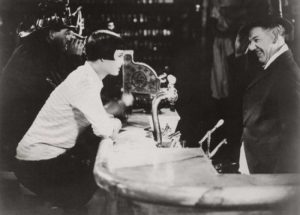STUDIO: Kino Lorber | DIRECTOR: Edward Sutherland | CAST: W.C. Fields, Louise Brooks, Blanche Ring, William Gaxton, Mary Foy
RELEASE DATE: 3/13/18 | PRICE: DVD $13.99, Blu-ray $29.95
BONUSES: new score composed by Ben Model, audio commentary by writer James Neibaur
SPECS: NR | 75 min. | Silent comedy | 1.33:1 fullscreen | 2.0 stereo
W.C. Fields is best remembered as a verbal comedian in Thirties talkies, but he spent decades before that as a juggler and physical comic on the stage and in silent films (six of the dozen he made are sadly lost). The 1926 feature It’s the Old Army Game offers the best glimpse of Fields’ physical humor and the formation of his “henpecked husband” character, which was a natural precursor of every harassed dad figure on later radio and TV sitcoms.
Like a lot of Fields’ best films, Army Game is a series of wonderful comic set-pieces that are punctuated by small snippets of plot. That plot concerns Elmer Prettywillie (Fields), a drug store owner who is unknowingly roped into selling bogus plots of land.
Joseph Geraghty, Joseph P. McEvoy and William Le Baron are the credited screenwriters, but Fields (like Mae West and Stan Laurel) devised and plotted the gags and set-pieces in his film work. Here he drew on a play he co-wrote with McEvoy, The Comic Supplement, which contained segments so funny he effortlessly expanded them in his later talkie masterpiece It’s a Gift (1934).
 The best of these is an extended sketch in which he tries to get some sleep out on his porch and is repeatedly woken up by loud tradespeople and neighbors. The most timeless of the other gags involve annoying customers, a plague that will last as long as retail stores are in existence.
The best of these is an extended sketch in which he tries to get some sleep out on his porch and is repeatedly woken up by loud tradespeople and neighbors. The most timeless of the other gags involve annoying customers, a plague that will last as long as retail stores are in existence.
The only odd element here is that Prettywillie isn’t a henpecked husband — he lives with his nagging sister and her bratty son, so he’s actually a henpecked uncle. He is also romantically pursued by the aged aunt of his own object of obsession, his store clerk, played by Louise Brooks.
Brooks’ character falls for the crooked (or is he — the film’s sudden ending claims otherwise) realtor; their bumpy romance is a subplot that is watchable only because of Brooks’ characteristic radiance onscreen.
Her acting was so subtle and under-played that one can readily see why her cult has remained strong for so many decades. Brooks’ future real-life husband Sutherland is wise enough to have her clad in a swimsuit (albeit a very demure body-covering number) for a “country swim” sequence that never actually takes place.
Army Game is not only a sort of portmanteau of bits that show off Fields’ comic agility (which he did exhibit in his talkies, but to a much lesser extent). It also provides a wonderful blueprint for the family comedies that he was to make just a few years later. Some of the drug store gags show up not only in It’s a Gift but also in his Mack Sennett shorts (The Pharmacist, The Barber Shop). One of his pithiest aphorisms appears here in the intertitles, both the dialogue and in the film’s “moral” — “Never give a sucker an even break.”
Army Game was released by Kino Lorber in tandem with another Fields’ silent, Running Wild (1927). Amusing but not as imaginative as Army Game, the film finds Fields cast once more as a henpecked character (in this instance it really is his wife controlling him) who is unwittingly hypnotized and dominates his former persecutors. The comic set-pieces are good, but it is not a must-see like Army Game.
|
Buy or Rent It’s the Old Army Game
|
|---|
Leave a Reply